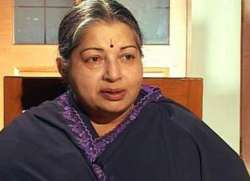Jayalalithaa Voices Objections On GST Bill
Chennai, Aug 22:Tamil Nadu Chief Minister Jayalalithaa today voiced her opposition to the proposed Goods and Services Tax Bill to Prime Minister Manmohan Singh, asserting it encroached on state powers and was like entering an

Chennai, Aug 22:Tamil Nadu Chief Minister Jayalalithaa today voiced her opposition to the proposed Goods and Services Tax Bill to Prime Minister Manmohan Singh, asserting it encroached on state powers and was like entering an “unknown territory” fraught with risk and uncertainty. She also appealed to non-Congress Chief Ministers to oppose the “clandestine and sinister” attempt, as the states would be “trapped in a bottomless pit”.
Accusing the Centre of trying to “bulldoze” the Constitution (115th Amendment) Bill, 2011, now before the Parliamentary Standing Committee on Finance, through Parliament, she said in a letter to Singh that this piece oflegislation “encroaches upon the powers vested with the states by the Constitution”.
Noting that sales tax was the only major buoyant source of revenue on which the states could depend, she said any tax reform measure driven by the Centre should neither reduce the revenue flow from this source, nor should it adversely affect the fiscal autonomy of the states.
“Approval of this Amendment Bill by any of the states will amount to entering into an unknown territory fraught with risk and uncertainty,” she said.Jayalalithaa said before the Centre pushes through the Bill in the Parliament, it is necessary that the consultative process among all states and the Centre is taken forward to come to a broad understanding on the framework of the proposed GST.
Expressing concern over the proposed GST Council and the GST Dispute Settlement Authority, Jayalalithaa said, “This means the states virtually lose their authority to fix tax rates, which is unconstitutional and not acceptable in a federal set-up.”
She said implementing GST with two rates initially and converging them to a single rate later is not workable. “In states like Tamil Nadu, where the tax neutral rate is as high as 17 per cent, this will lead to a huge loss, i.e., more than Rs 5,000 crore per annum. Any proposal of GST structure will have to address these concerns,” she said. “The manner in which the government of India is undertaking the implementation of GST amounts to interfering with the fiscal autonomy of the states, thereby having the potential to jeopardise the federal framework of distribution of fiscal powers between the states and the Union,” she said.
She asked the Prime Minister to continue the consultative process to arrive at a broad consensus on the issue. In separate letters to all non-Congress Chief Ministers, Jayalalithaa reminded that the sales tax/VAT was the only major source of revenue for the states, while the Centre has many sources of income.
“The government of India is attempting to stealthily encroach upon even this single buoyant source of revenue for the state governments in the name of indirect tax reforms,” she said.
Jayalalithaa said when many States continue to raise many pertinent and critical issues like tax structure, convergence of tax rates,compensation mechanism,etc during the discussions in the Empowered Committee of State Finance/Taxation ministers, “to our shock and dismay, the Government of India has chosen to introduce the Amendment Bill in Parliament without addressing any of them.”
Noting that she had highlighted many issues related to GST in her letter to the Prime Minister, Jayalalithaa said that the concerns needed to be addrressed and a broad consensus arrived at, “failing which the States will be trapped in a bottomless pit, with the GST regime being thrust upon them.” “Though the States have the power to withhold their consent to bring the Amendment into force as the Government of India will require ratification by the majority of the States, this clandestine and sinister attempt on its part needs to be opposed vehemently at the Bill stage itself,”she said.
Jayalalithaa had earlier opposed the Prevention of Communal Violence Bill and appealed to non-Congress Chief Ministers to reject it. PTI